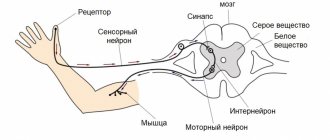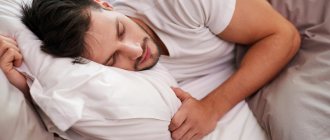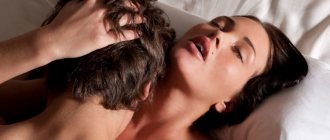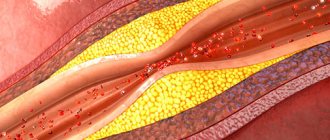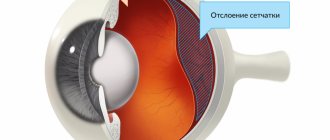Reasons why your head hurts after sleep
Feeling unwell after a night's rest affects not only a person's mood, but also the efficiency of work. Depressive feelings, increased irritability, and unstable emotional state affect relationships with others and the correctness of professional tasks performed. Along with relatively simple, non-pathological causes of pain, which can be corrected by lifestyle changes, the appearance of an uncomfortable symptom can be influenced by serious illnesses that require urgent medical attention.
Factors not associated with head diseases
External stimuli that can affect a person’s general well-being are listed in the following list:
- Insufficient rest period, which leaves less than seven hours.
- Oversleeping.
- Drinking alcohol before going on vacation or stimulating energy drinks, including coffee.
- Staying in front of a TV or computer screen for a long time, exposure to blue lighting, flickering, irritating visual receptors, why do you get a headache after sleep?
- Uncomfortable posture leading to prolonged muscle tension.
- Overheating or prolonged exposure to the sun.
- Depressive state.
A person may simply systematically not get enough sleep due to his own or someone else’s snoring or other external noise.
Prevention methods
Timely prevention will protect against the occurrence of headaches in the morning and the development of dangerous chronic diseases. At home, it is enough to follow a few simple rules to maintain good health after waking up:
- follow a diet that excludes excess salt and spices, instant coffee, and alcoholic drinks;
- give up fatty foods, strong coffee and tea, alcohol before bedtime;
- spend time outdoors, frequently ventilate the sleeping area;
- monitor your weight and regularly engage in light physical activity;
- Consult your doctor about choosing a mattress and pillow.
At the Clinical Brain Institute, you can undergo a complete diagnosis and treatment of headaches that appear in the morning after sleep. Programs are developed individually, depending on the symptoms and data from the initial examination. The center has the opportunity to get advice from experienced specialists of a narrow and broad profile who will be able to make an accurate diagnosis and prescribe the most effective treatment using only the necessary techniques. However, at home it is important to follow all instructions and follow the rules for preventing headaches.
Clinical Brain Institute Rating: 3/5 — 42 votes
Share article on social networks
Factors associated with internal pathologies
Pain is not a separate disease, but the first sign of the development of any disorders occurring in the body. If the abnormal condition manifests itself sporadically, and a lot of time passes between attacks, it is not advisable to worry about the presence of a complex disease. If discomfort occurs systematically and is complemented by other pathological signs, it is necessary to find out why the head hurts after sleep and what is the primary source of this condition.
Frequent factors causing discomfort and heaviness in the cranium are:
- spasms of the muscles located in the upper shoulder girdle or neck;
- atherosclerotic disorders, increased internal pressure, stroke;
- head injury as a result of mechanical impact or surgery;
- thrombosis of vascular pathways, resulting in a decrease in the intensity of blood supply and nutrition to brain tissue;
- general intoxication with chemical or biological toxic elements;
- tumor formations in the cranium or cervical region.
Pathologically growing objects in brain tissue are capable of compressing parts of the organ, pinching vascular channels and nerves, which leads to pain.
Examination methods
Diagnosis of headaches is carried out using complex techniques, tests and equipment. A simple examination is not enough to determine the cause of morning discomfort and poor health. The doctor may prescribe a set of examinations, which include:
- blood tests - a way to determine viral and bacterial infections, hormonal disorders, poisoning, vitamin imbalance and other diseases;
- Ultrasound, cardiography – techniques for examining the heart to identify defects, heart rhythm and conduction disturbances, congenital and acquired structural anomalies;
- Dopplerography - ultrasound diagnostics of blood vessels using a contrast agent, prescribed if insufficient blood supply to the brain is suspected;
- MRI of the head and neck is an informative diagnostic method for identifying neoplasms, acute and chronic diseases, and examining the cervical spine.
The Clinical Brain Institute has all the conditions for a complete examination for headaches. Modern equipment, doctors with many years of experience, the ability to obtain accurate results are our main advantages.
Diagnosis of head diseases
Symptomatic manifestations are often not specific and may indicate the development of different diseases that need to be differentiated. At the initial stage, the examination is carried out by a therapist or neurologist, who, if necessary, will involve specialists from other areas in the research manipulations: an endocrinologist, a neurosurgeon, a somnologist, an oncologist. If pain occurs, a standard set of diagnostic procedures is prescribed, which includes:
- laboratory analytical screenings;
- electroencephalographic studies;
- radiography;
- ultrasound scanning of the vessels of the neck and head;
- computed tomography screening;
- magnetic resonance examination.
The best way to detect diseases of various etiologies is MRI, as it allows you to visualize tissues of varying densities, pathological areas with microscopic disorders that cause pain. Screening is carried out using a special device that generates a high-frequency magnetic field. When under its influence, dissonance occurs in the nuclei of biological fibers, which is recorded by equipment. The signature is converted into clear black and white images that can not only be zoomed in, but also composited into a 3D model.
Types of morning headaches
There are many causes of headaches in the morning. This symptom is the body’s reaction to receptor irritation, and therefore occurs with any disorder. Receptors are located in the skin, muscles and soft tissues, meninges, as well as on the inner wall of blood vessels. Depending on the type and mechanism of development, several types of headaches after sleep can be distinguished.
- Vascular headache – this type includes cerebral atriovenous dystonia. One of the mechanisms for the development of pain is stretching of the vascular walls due to increased blood pressure and a decrease in their tone. Pain can also occur when there is a sharp spasm of blood vessels or when there is a violation of the outflow of fluid and its accumulation in the venous bed.
- Tension headaches are caused by muscle spasms in the neck and head. They compress nerves and blood vessels, blocking blood access to the brain. This type of pain can be associated with intense physical or mental stress, stress, and nervous tension. It is also caused by chronic diseases of the cervical spine, intoxication and other factors.
- Neuralgic – associated with inflammation or compression of the trigeminal nerve. The pain is acute, throbbing, and often worsens after sleep or prolonged periods without movement. Neuralgia is characterized by increased symptoms in a certain position, during pressure on the damaged nerve.
- Liquorodynamics - the reason why the head hurts in the morning is a deterioration in the drainage of fluid from the brain. As a result, intracranial pressure increases, which leads not only to constant pain, but also to nervous disorders, problems with hearing and vision, and slow development in children.
- Headache of a psychogenic nature - occurs during stress, sleep disturbances, and nervous tension. During the examination, no pathologies are detected, and the pain is caused by increased activity of the nervous system.
Most patients experience headaches of mixed origin. When diagnosing one problem, several violations are detected simultaneously, which complement each other. It is important to determine which of them is the main one and begin treatment.
How to get rid of pain?
When the original source of heaviness and discomfort in the head is discovered, specific therapy is prescribed, aimed not only at relieving uncomfortable symptoms, but also at getting rid of the source of the anomaly. Directed drug therapy is most often used. If hidden inflammatory processes or internal infection are detected, antibacterial drugs and anti-inflammatory drugs are used.
Vascular and muscle spasms are relieved with antispasmodics. To relieve pain in the head, broad-spectrum analgesics are used. If discomfort occurs sporadically, you can use your usual painkillers. Severe attacks similar to migraines can be relieved only with targeted neurological drugs, which can only be prescribed by the treating specialist.
Treatment of morning headaches
The treatment regimen is selected individually and depends on the clinical picture, the exact diagnosis, the patient’s age and other factors. It will include several stages aimed at eliminating the root cause of morning headaches and relieving symptoms.
- Drug therapy is prescribed for pain of any origin. The regimen may include the use of painkillers and anti-inflammatory drugs, muscle relaxants, and antispasmodics. For hypertension, diuretics and drugs to correct vascular tone are additionally prescribed. Infectious diseases often require the use of antibiotics to kill pathogenic bacteria.
- Massage, physiotherapy, therapeutic exercises are a complex effective for the treatment of diseases of the cervical spine, inflammatory diseases of the nerves and blood vessels. They help improve blood circulation in the neck and head, relieve muscle spasms, and restore nerve conduction.
- Surgical intervention is used only in cases where drug treatment does not bring results. Surgery may be required to treat purulent sinusitis, remove tumors and hematomas in the neck and head.
Most patients who experience frequent morning headaches are treated at home. It is important to take medications on the schedule prescribed by your doctor, as well as follow additional instructions. If necessary, the Clinical Institute of the Brain has the opportunity to undergo treatment in a hospital setting, under 24-hour medical supervision.
Where is the head examination performed?
Directed diagnostics are carried out in specialized institutions that have tomography facilities. You can find a multifunctional research center on the website of the unified recording service, the telephone number of which is indicated at the top of the page. The portal contains data from all tomography clinics located in each district of the city. Study the information, mark the best offers, make an appointment and receive a special discount from the service in the amount of 1000 rubles for the selected type of screening.
